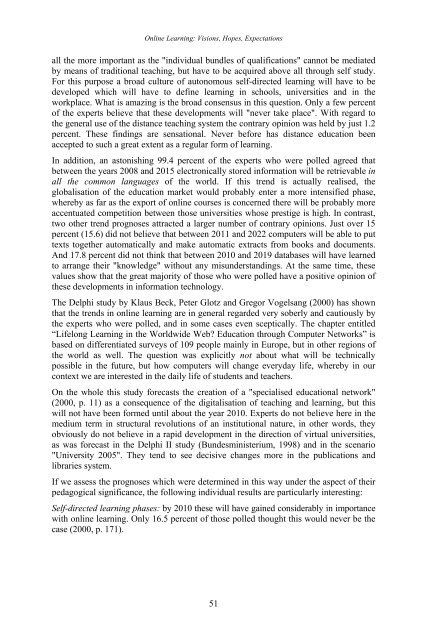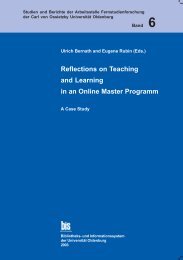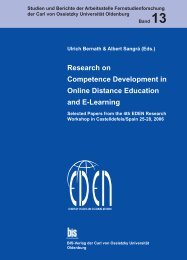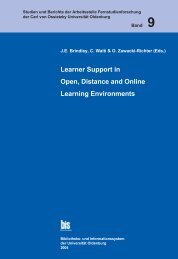Distance Education in Transition - Master of Distance Education ...
Distance Education in Transition - Master of Distance Education ...
Distance Education in Transition - Master of Distance Education ...
Create successful ePaper yourself
Turn your PDF publications into a flip-book with our unique Google optimized e-Paper software.
Onl<strong>in</strong>e Learn<strong>in</strong>g: Visions, Hopes, Expectations<br />
all the more important as the "<strong>in</strong>dividual bundles <strong>of</strong> qualifications" cannot be mediated<br />
by means <strong>of</strong> traditional teach<strong>in</strong>g, but have to be acquired above all through self study.<br />
For this purpose a broad culture <strong>of</strong> autonomous self-directed learn<strong>in</strong>g will have to be<br />
developed which will have to def<strong>in</strong>e learn<strong>in</strong>g <strong>in</strong> schools, universities and <strong>in</strong> the<br />
workplace. What is amaz<strong>in</strong>g is the broad consensus <strong>in</strong> this question. Only a few percent<br />
<strong>of</strong> the experts believe that these developments will "never take place". With regard to<br />
the general use <strong>of</strong> the distance teach<strong>in</strong>g system the contrary op<strong>in</strong>ion was held by just 1.2<br />
percent. These f<strong>in</strong>d<strong>in</strong>gs are sensational. Never before has distance education been<br />
accepted to such a great extent as a regular form <strong>of</strong> learn<strong>in</strong>g.<br />
In addition, an astonish<strong>in</strong>g 99.4 percent <strong>of</strong> the experts who were polled agreed that<br />
between the years 2008 and 2015 electronically stored <strong>in</strong>formation will be retrievable <strong>in</strong><br />
all the common languages <strong>of</strong> the world. If this trend is actually realised, the<br />
globalisation <strong>of</strong> the education market would probably enter a more <strong>in</strong>tensified phase,<br />
whereby as far as the export <strong>of</strong> onl<strong>in</strong>e courses is concerned there will be probably more<br />
accentuated competition between those universities whose prestige is high. In contrast,<br />
two other trend prognoses attracted a larger number <strong>of</strong> contrary op<strong>in</strong>ions. Just over 15<br />
percent (15.6) did not believe that between 2011 and 2022 computers will be able to put<br />
texts together automatically and make automatic extracts from books and documents.<br />
And 17.8 percent did not th<strong>in</strong>k that between 2010 and 2019 databases will have learned<br />
to arrange their "knowledge" without any misunderstand<strong>in</strong>gs. At the same time, these<br />
values show that the great majority <strong>of</strong> those who were polled have a positive op<strong>in</strong>ion <strong>of</strong><br />
these developments <strong>in</strong> <strong>in</strong>formation technology.<br />
The Delphi study by Klaus Beck, Peter Glotz and Gregor Vogelsang (2000) has shown<br />
that the trends <strong>in</strong> onl<strong>in</strong>e learn<strong>in</strong>g are <strong>in</strong> general regarded very soberly and cautiously by<br />
the experts who were polled, and <strong>in</strong> some cases even sceptically. The chapter entitled<br />
“Lifelong Learn<strong>in</strong>g <strong>in</strong> the Worldwide Web? <strong>Education</strong> through Computer Networks” is<br />
based on differentiated surveys <strong>of</strong> 109 people ma<strong>in</strong>ly <strong>in</strong> Europe, but <strong>in</strong> other regions <strong>of</strong><br />
the world as well. The question was explicitly not about what will be technically<br />
possible <strong>in</strong> the future, but how computers will change everyday life, whereby <strong>in</strong> our<br />
context we are <strong>in</strong>terested <strong>in</strong> the daily life <strong>of</strong> students and teachers.<br />
On the whole this study forecasts the creation <strong>of</strong> a "specialised educational network"<br />
(2000, p. 11) as a consequence <strong>of</strong> the digitalisation <strong>of</strong> teach<strong>in</strong>g and learn<strong>in</strong>g, but this<br />
will not have been formed until about the year 2010. Experts do not believe here <strong>in</strong> the<br />
medium term <strong>in</strong> structural revolutions <strong>of</strong> an <strong>in</strong>stitutional nature, <strong>in</strong> other words, they<br />
obviously do not believe <strong>in</strong> a rapid development <strong>in</strong> the direction <strong>of</strong> virtual universities,<br />
as was forecast <strong>in</strong> the Delphi II study (Bundesm<strong>in</strong>isterium, 1998) and <strong>in</strong> the scenario<br />
"University 2005". They tend to see decisive changes more <strong>in</strong> the publications and<br />
libraries system.<br />
If we assess the prognoses which were determ<strong>in</strong>ed <strong>in</strong> this way under the aspect <strong>of</strong> their<br />
pedagogical significance, the follow<strong>in</strong>g <strong>in</strong>dividual results are particularly <strong>in</strong>terest<strong>in</strong>g:<br />
Self-directed learn<strong>in</strong>g phases: by 2010 these will have ga<strong>in</strong>ed considerably <strong>in</strong> importance<br />
with onl<strong>in</strong>e learn<strong>in</strong>g. Only 16.5 percent <strong>of</strong> those polled thought this would never be the<br />
case (2000, p. 171).<br />
51





